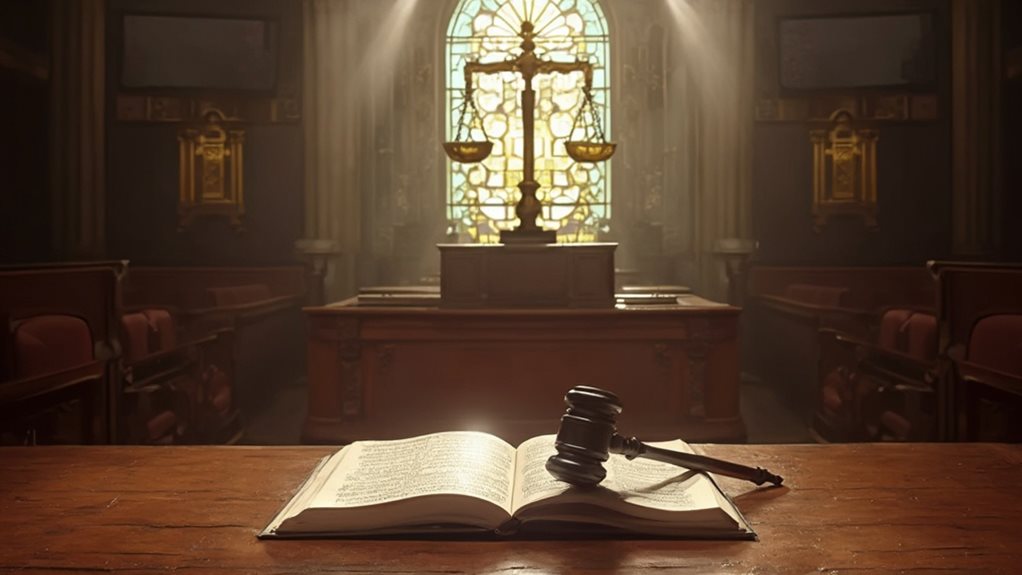
Divine guidance stands as the ultimate moral compass, offering unwavering clarity through celestial principles. It embodies a robust framework that navigates ethical decisions, molds character with virtues like honesty and compassion, and executes justice with divine laws. In the domain of moral dilemmas, it provides a beacon of truth, fortifying the soul against compromise. As one explores further, deeper insights into cultivating ethical behavior and integrity reveal themselves, guided by transcendent wisdom.
Key Takeaways
- Divine guidance offers a clear framework for ethical decisions, aligning actions with celestial directives.
- It acts as a spiritual GPS, helping navigate complex moral choices.
- Scriptural study and meditation provide a deep connection to divine wisdom, enhancing moral clarity.
- Virtues like honesty, compassion, and courage are cultivated, shaping a morally attuned character.
- Divine command theory ensures actions are consistent with divine laws, fostering a just and fair society.
How Divine Command Theory Functions as Your Moral GPS

How does one navigate the complex landscape of moral choices in today's world? Divine Command Theory offers a beacon of moral clarity, guiding individuals through the murky waters of ethical dilemmas.
By adhering to divine directives, one engages in ethical navigation, aligning actions with celestial mandates. This theory eliminates the haze of uncertainty, providing clear, divine approval for decisions.
It acts as a spiritual GPS, where moral routes are not dictated by fleeting societal norms but by steadfast, divine wisdom. Consequently, individuals are equipped not just to choose but to choose wisely, ensuring their moral compass aligns with divine guidance.
The Role of Virtues in Guiding Ethical Decisions
While Divine Command Theory provides a framework for moral guidance, it is the virtues—such as honesty, compassion, and courage—that illuminate the path for ethical decisions.
In the domain of virtue ethics, these qualities are not merely traits but are central to the development of moral character. They act as divine beacons that guide behavior in accordance with celestial wisdom.
Honesty promotes transparency and trustworthiness, compassion fosters understanding and empathy, and courage enables the fortitude to uphold righteousness despite challenges.
Collectively, these virtues shape a soul attuned to the divine, ensuring that each choice reflects the higher moral law.
The Impact of Divine Laws on Justice and Fairness

As divine laws emanate from a higher authority, they lay the foundational stones for justice and fairness within society.
These eternal decrees, inscribed by the divine hand, offer moral clarity, guiding human actions toward righteousness. They serve as unwavering benchmarks, ensuring that each judgment reflects divine accountability.
Through these sacred texts, individuals learn not only the distinction between right and wrong but also the virtues of equity and impartiality.
Consequently, divine laws act as a celestial arbiter, fostering a just society where fairness prevails, and moral integrity is upheld, aligning earthly justice with heavenly wisdom.
Strategies for Cultivating Ethical Behavior and Integrity
Building on the foundation laid by divine laws, it becomes imperative to explore the practical applications of these eternal principles in everyday life, guiding individuals towards a path of ethical behavior and integrity. Implementing ethical habits and fostering integrity development are critical steps in this journey.
| Strategy | Outcome |
|---|---|
| Daily Reflection | Enhances self-awareness |
| Scriptural Study | Anchors actions in divine truth |
| Community Service | Builds empathy and selflessness |
| Accountability | Guarantees consistency in actions |
| Meditation | Cultivates inner peace and focus |
These practices, rooted in spiritual insight, guide one towards a harmonious and principled life.
Utilizing Divine Wisdom to Resolve Moral Dilemmas

Given the complexity of modern ethical challenges, divine wisdom serves as an indispensable tool in resolving moral dilemmas.
In scriptural narratives, divine guidance often illuminates paths toward moral clarity, providing believers with robust ethical frameworks to navigate thorny issues. This wisdom, transcending mere human understanding, encourages a reflection that aligns personal actions with celestial principles.
As individuals confront moral quandaries, the divine perspective offers a beacon of truth, ensuring decisions are not merely expedient but just and righteous.
Consequently, adhering to divine wisdom not only fosters ethical integrity but also fortifies the soul against moral compromise.
Frequently Asked Questions
Can Divine Command Theory Adapt to Evolving Societal Norms?
Divine Command Theory may struggle with adapting to evolving societal norms due to its fixed divine directives, potentially lacking divine flexibility necessary for alignment with continuous societal evolution. Ethical focus remains static.
How Does One Discern True Divine Commands From Misinterpretations?
Maneuvering the maze of spirituality, one achieves ethical clarity through spiritual discernment. By comparing scriptural references with ethical focus, individuals distinguish true divine commands from misinterpretations, ensuring decisions reflect deep spiritual insight.
Are Virtues Culturally Relative or Universally Applicable?
The debate on virtues hinges on cultural context and ethical relativism. Some argue virtues are universally applicable, transcending cultures with immutable ethical focus, while others see them as shaped by societal norms and conditions.
How Can Atheists Benefit From Virtues Emphasized by Divine Laws?
Atheists, traversing the vast ocean of moral philosophy, benefit from virtues in divine laws as universal ethical frameworks, offering timeless spiritual insight and guiding ethical behavior regardless of religious alignment.
What Role Does Personal Intuition Play in Divine Wisdom?
Personal intuition, through intuitive insights and spiritual discernment, complements divine wisdom by providing internal cues that align with broader ethical teachings. It enhances decision-making by integrating personal understanding with established spiritual and moral principles.
Conclusion
In sum, Divine Command Theory offers a celestial compass, guiding the faithful through life's moral labyrinth. Just as a lighthouse steers ships away from perilous shores, so too does divine wisdom illuminate the path of righteousness. Embracing virtues and adhering to divine laws fosters a life of integrity and justice. Therefore, in the quest for moral clarity, one finds solace in the divine—our ancient yet ever-relevant moral guidepost for steering through the complex seas of ethical decision-making.

